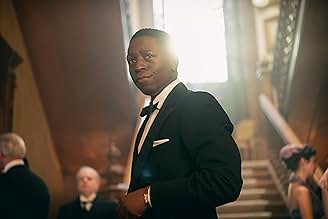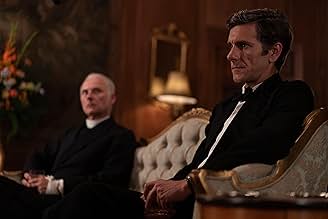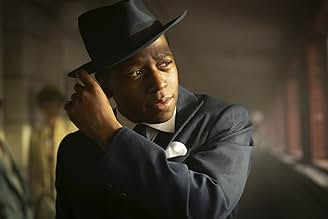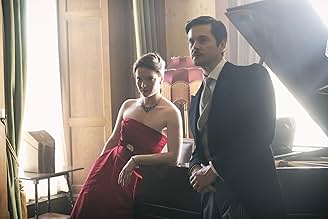Follows Luke Fitzwilliam, as he finds himself on the trail of a serial killer after meeting Miss Pinkerton on a train to London. Now Fitzwilliam has to find the killer before any more blood ... Read allFollows Luke Fitzwilliam, as he finds himself on the trail of a serial killer after meeting Miss Pinkerton on a train to London. Now Fitzwilliam has to find the killer before any more blood will be shed.Follows Luke Fitzwilliam, as he finds himself on the trail of a serial killer after meeting Miss Pinkerton on a train to London. Now Fitzwilliam has to find the killer before any more blood will be shed.
- Awards
- 1 nomination total
Browse episodes
Featured reviews
Agatha Christie has a chequered history with Tv and Film adaptations, from early Poirot characterisations that made him French, yes French. Margaret Rutherford was a fun but hardly faithful to the source Miss Marple. The recent ITV adaptations of Marple have played fast a loose with the narratives and even changed murderers at points. So, it's true to say that adapting Christie can be fraught with difficulty when it appears 'easy'.
This adaptation was a mess on many levels. From a sub Wes Anderson approach to texture and editing rhythm, strange close ups, wobbly camera work and a script that clanked along pouring exposition on top of the imposition of a post-colonial narrative - it just didn't mesh.
The ideas were bold, and in many ways could have been brilliant, just so many choices at once going away from the source material began to stress the story so much that it became vague and confused, an original piece about colonial attitudes in the 20th Century or a straight down the line thriller would have been much more effective and a much stronger choice from the BBC.
The problem with BBC commissions at the moment is their lack of vision to make original drama, they appear to want to be commercial whilst trying to service what is current and hotly debated. This leaves the BBC feeling confused and only concerned with issues that trend in London and liberal media outlets.
ITV have delivered Christie stronger, better and more radically than the BBC over the last two decades. So perhaps it would be nice to see this 'tradition' of a bbc Christie at Christmas knocked on the head, until they begin to understand how to produce drama that doesn't betray the source.
This was just a real dud.
This adaptation was a mess on many levels. From a sub Wes Anderson approach to texture and editing rhythm, strange close ups, wobbly camera work and a script that clanked along pouring exposition on top of the imposition of a post-colonial narrative - it just didn't mesh.
The ideas were bold, and in many ways could have been brilliant, just so many choices at once going away from the source material began to stress the story so much that it became vague and confused, an original piece about colonial attitudes in the 20th Century or a straight down the line thriller would have been much more effective and a much stronger choice from the BBC.
The problem with BBC commissions at the moment is their lack of vision to make original drama, they appear to want to be commercial whilst trying to service what is current and hotly debated. This leaves the BBC feeling confused and only concerned with issues that trend in London and liberal media outlets.
ITV have delivered Christie stronger, better and more radically than the BBC over the last two decades. So perhaps it would be nice to see this 'tradition' of a bbc Christie at Christmas knocked on the head, until they begin to understand how to produce drama that doesn't betray the source.
This was just a real dud.
I confess to being a lover of Agatha Christie. Having read every book and seen every ITV Poirot and all renditions of Miss Marple.
I found the beginning of this plot really gripping thanks to Miss Pinkerton aaand was looking forward to how things developed. I did not like the decision to introduce a black Nigerian character with the odd confusing vision on top of an already busy plot. I also found the pletherer of well known actors playing characature roles distracting.
The bright colours had my eyes straining and desperately reaching for the contrast adjustment on my remote.
The plot was plodding but at least it was so confusing it took me a while to work out which of the books I was watching. I realised in enough time to recall who did it and why.
I found the acting wooden throughout but to be fair it reflected the stuffy English class system of the period. The setting, costumes and cars was excellent.
I felt Fitzwilliams character out of place yet deserving of an entirely different production.
Without giving the plot away this is one of Christies more disturbing plots with a cold blooded murderer who really does find Murder is Easy witb weight added being based on more than a little truth to there being some people, such as Dr Shipman, who hide among us capable of such awful deeds. .
I found the beginning of this plot really gripping thanks to Miss Pinkerton aaand was looking forward to how things developed. I did not like the decision to introduce a black Nigerian character with the odd confusing vision on top of an already busy plot. I also found the pletherer of well known actors playing characature roles distracting.
The bright colours had my eyes straining and desperately reaching for the contrast adjustment on my remote.
The plot was plodding but at least it was so confusing it took me a while to work out which of the books I was watching. I realised in enough time to recall who did it and why.
I found the acting wooden throughout but to be fair it reflected the stuffy English class system of the period. The setting, costumes and cars was excellent.
I felt Fitzwilliams character out of place yet deserving of an entirely different production.
Without giving the plot away this is one of Christies more disturbing plots with a cold blooded murderer who really does find Murder is Easy witb weight added being based on more than a little truth to there being some people, such as Dr Shipman, who hide among us capable of such awful deeds. .
My husband and I are impressed with David Jonsson, whom we are watching for the first time. His character is classy, like old school acting we haven't seen in a while.
I am no more a fan of revising classic works than the next Marple fan. I've seen "4:50 to Paddington," with Joan Hickson, more times than I can count. When it was remade some years later, there were some tweaks to the story, but I enjoyed that version too, especially with Highclere as the filming location. As far as other retellings after Joan Hickson's time, I felt some were good and some not.
They never did "Murder is Easy," with Joan Hickson. In my opinion, Benedict Cumberbatch made the version he was in, as he assisted Miss Marple ("not a Miss Pinkerton" - no offense to the wonderful Penelope Wilton) because, frankly, the subject was particularly distasteful.
I am reviewing this before I see the second part of this new "Murder is Easy" because I already know my opinion of what makes watching this version worth at least one viewing: the lovely filming locations, Penelope Wilton, Douglas Henshall, Mark Bonnar, Matthew Baynton, and the old-style charm of David Jonsson, which is why I'm being generous with my rating.
I doubt the BBC cares what fans of British mysteries think of their revisions. There have been some pretty awful re-re-re-retellings of classic titles this past decade, to be sure. The best we can do is not watch what isn't good - but then we can't always know it isn't good until we watch. And maybe that's why the BBC keeps the bad revisions coming? No, they'll do what they want anyway.
I am no more a fan of revising classic works than the next Marple fan. I've seen "4:50 to Paddington," with Joan Hickson, more times than I can count. When it was remade some years later, there were some tweaks to the story, but I enjoyed that version too, especially with Highclere as the filming location. As far as other retellings after Joan Hickson's time, I felt some were good and some not.
They never did "Murder is Easy," with Joan Hickson. In my opinion, Benedict Cumberbatch made the version he was in, as he assisted Miss Marple ("not a Miss Pinkerton" - no offense to the wonderful Penelope Wilton) because, frankly, the subject was particularly distasteful.
I am reviewing this before I see the second part of this new "Murder is Easy" because I already know my opinion of what makes watching this version worth at least one viewing: the lovely filming locations, Penelope Wilton, Douglas Henshall, Mark Bonnar, Matthew Baynton, and the old-style charm of David Jonsson, which is why I'm being generous with my rating.
I doubt the BBC cares what fans of British mysteries think of their revisions. There have been some pretty awful re-re-re-retellings of classic titles this past decade, to be sure. The best we can do is not watch what isn't good - but then we can't always know it isn't good until we watch. And maybe that's why the BBC keeps the bad revisions coming? No, they'll do what they want anyway.
This quite village murder mystery was pitched just right. Is there a serial killer in their midst or is it just a bizarre series of accidents? Sometimes it takes an outsider to see through to the truth. The outsider being David Jonsson who is solid as the Nigerian finding his way in post war britain. What connects these victims and who has a motive for their murder. All these are answered but not before the body count is increased. This is a period Mid Sommer style of mystery. I have not read the book, but was certainly entertained by the two part drama. A solid seven. See for yourself on iPlayer before dismissing.
Putting a new spin on an old story is nothing new, and occasionally produces real gems, so ignore the people who were always going to hate anything that places brown faces in roles they grew up seeing white ones on TV. Despite the racism of the past, there were a good number of notably successful black and Asian people in Britain and the US (going back a couple of hundred years) - they just weren't in the films and TV shows the people complaining watched as children, and they weren't taught about in schools.
All that said, there are many more legitimate reasons to swerve this adaptation. It just lacked any real sense of jeopardy or tension. The pacing was off. Many of the characters came across as caricatures. There were too many ideas and unfinished / unexplored red herrings and other dramatic devices. All in all, it just felt like it was executed by people who don't love or understand the genre. Worth dozing on the sofa to one Sunday afternoon, but not much more than that, I'm afraid.
All that said, there are many more legitimate reasons to swerve this adaptation. It just lacked any real sense of jeopardy or tension. The pacing was off. Many of the characters came across as caricatures. There were too many ideas and unfinished / unexplored red herrings and other dramatic devices. All in all, it just felt like it was executed by people who don't love or understand the genre. Worth dozing on the sofa to one Sunday afternoon, but not much more than that, I'm afraid.
Did you know
- TriviaLuke Obiako Fitzwilliam's character is based on the 1939 book's Luke Fitzwilliam -- a role that has been played by Bill Bixby in the 1982 TV movie, Peter Capaldi in the 1993 London stage version, and Benedict Cumberbatch in the 2009 TV version alongside an additional amateur detective, Julia McKenzie's Miss Marple.
- GoofsWhen the lead character is pushing through the group to get to the character killed in the street, the lady in the orange hat gets hit twice in the head with his umbrella, firstly from behind then to the front which you can clearly see her flinch.
- ConnectionsVersion of Un meurtre est-il facile? (1982)
Details
- Runtime1 hour 57 minutes
- Color
Contribute to this page
Suggest an edit or add missing content

Top Gap
What is the Canadian French language plot outline for Un meurtre est-il si facile ? (2023)?
Answer


































